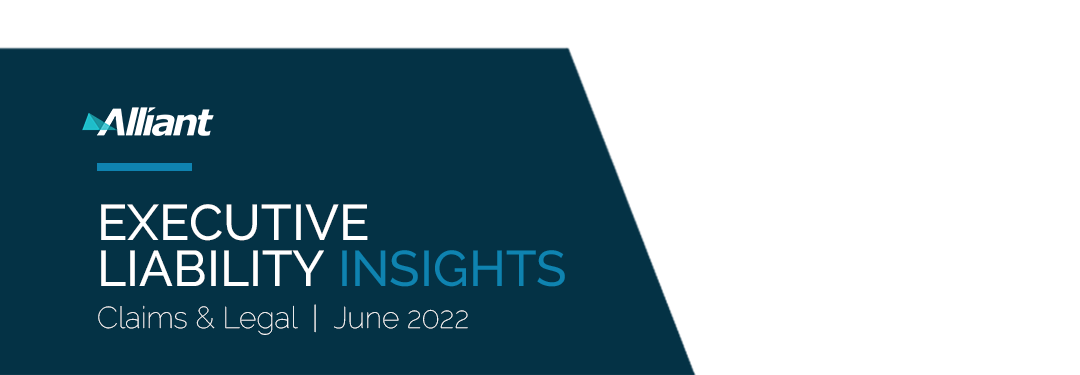
Navigating today’s complex risk environment can be a monumental task. Steve Shappell, Alliant Claims & Legal, spearheads Executive Liability Insights, a monthly review of news, legal developments and information on executive liability, cyber risk, employment practices liability, class action trends and more.

FEATURED ARTICLE
EUROPEAN UNION TO SLAP FURTHER RESTRICTIONS ON SOCIAL MEDIA PLATFORMS AND SEARCH ENGINES
The European Union (“EU”) has led the way in the area of data privacy with the landmark General Data Protection Regulation (“GDPR”), which took effect in 2018. Recently, the EU broke ground again, reaching an agreement to adopt the Digital Services Act (“DSA”), which will impose new responsibilities on technology companies.
In This Issue:
HOSPITALITY COMPANY'S CYBERSECURITY DISCLOSURES DID NOT VIOLATE SECURITIES LAWS
Construction Laborers Pension Trust S. CA v. Marriott Int’l, Inc., No. 21-1802 (4th Cir. Apr. 21, 2022)
Following a data breach, investors of a hospitality company alleged the company and its executives violated federal securities laws by omitting material information in their public statements about data vulnerabilities stemming from the acquisition of another hospitality company.
Read More >>
CASES INVOLVING INTERRELATEDNESS RESULT INOPPOSING OUTCOMES
In two recent cases, insureds received claim-related documents prior to the inception of the policy periods under which they sought coverage. Despite the similar fact patterns in both cases, the phrase “arising out of” and the definition of “Claim” in the policies at issue yielded divergent outcomes.
Read More >>
CALIFORNIA UPHOLDS FEDERAL FORUM PROVISIONS IN IPO SHAREHOLDER LITIGATION
Wong v. Restoration Robotics, Inc., No. A161489 (Ct. App. Cal. Apr. 28, 2022)
Following a medical device company’s IPO and subsequent stock drop, a shareholder lawsuit was filed in California state court under the Securities Act of 1933 (“’33 Act”).
Read More >>
ACTUAL RATHER THAN CONSTRUCTIVE NOTICE DETERMINES WHEN CLAIM IS MADE UNDER LIABILITY POLICY
Phila. Indem. Ins. Co. v. Lewis Produce Mkt. No. 2, 21 C 4037 (N.D. Ill. Apr. 7, 2022)
A purported class action suit was filed against a supermarket business alleging violations of the Illinois Biometric Privacy Act (“BIPA”).
Read More >>
COURT FINDS BANK'S OVERDRAFT FEES ARE NOT USURY
Walker v. BOKF, No. 20-2046 (10th Cir. Apr. 8, 2022)
When a customer of a bank overdrew his checking account, the bank charged the customer an “Extended Overdraft Charge” for each business day the account balance was negative, which ultimately resulted in a total of 36 overdraft charges.
Read More >>
CHANCERY RULES ACQUISITION OF SOLAR POWER COMPANY WAS "ENTIRELY FAIR"
In Re Tesla Motors, Inc. Stockholders Litig., No. 12711-VCS (Del. Ch. Apr. 27, 2022)
This matter arose out of an acquisition in which an electric vehicle company (the “EV Company”) acquired a cash-strapped solar energy company in an all-stock transaction.
Read More >>
CYBER CORNER
Click to read the following cases:
- EUROPEAN UNION TO SLAP FURTHER RESTRICTIONS ON SOCIAL MEDIA PLATFORMS AND SEARCH ENGINES
- COURT APPLIES BROAD INTERPRETATION TO “DIRECT LOSS” WORDING IN COMPUTER FRAUD CLAIM
Read More >>
EPL CORNER
Click to read the following cases:
- NINTH CIRCUIT UPHOLDS EMPLOYER’S GOOD FAITH DEFENSE IN MISCLASSIFICATION DISPUTE
- INDIVIDUAL ARBITRATION AGREEMENTS NOT BINDING FOR ERISA SUIT
- JUDICIAL EMPLOYEE’S HARASSMENT CLAIM UNDER EMPLOYEE DISPUTE REOLUTION PLAN MOVES FORWARD
Read More >>
SEC CORNER
Click to view the following cases:
- SEC RESPONDS TO INVESTORS’ PUSH FOR MORE CLIMATE DISCLOSURES FROM INSURANCE COMPANIES
Read More >>
SHAREHOLDER CORNER
Click to view the following:
- 2022 SPAC-RELATED SECURITIES CLASS ACTION FILINGS
- MAY 2022 SECURITIES CLASS ACTION FILINGS
Read More >>
HOSPITALITY COMPANY’S CYBERSECURITY DISCLOSURES DID NOT VIOLATE SECURITIES LAWS
Construction Laborers Pension Trust S. CA v. Marriott Int’l, Inc., No. 21-1802 (4th Cir. Apr. 21, 2022)

Following a data breach, investors of a hospitality company alleged the company and its executives violated federal securities laws by omitting material information in their public statements about data vulnerabilities stemming from the acquisition of another hospitality company.
Specifically, investors alleged violation of Section 10(b) of the Securities Exchange Act of 1934 and Securities and Exchange Commission Rule 10b-5. The district court dismissed the investors’ complaint, finding it did not adequately allege the company’s statements were “false or misleading” at the time they were made.
In reviewing the underlying decision, the Fourth Circuit Court of Appeals noted that not all material omissions are actionable; a disclosure is only necessary to make a “statement made, in the light of the circumstances under which they are made, not misleading” or when its absence would “influence an investment decision.” Furthermore, the court noted that the public statements made around protecting customer data did not “assign a quality” to the company’s cybersecurity that it did not have, only that the company considered its cybersecurity to be important. Additionally, the key risks the company disclosed in its filings made it unlikely that a reasonable reader would have found those statements to have overrepresented the extent to which the company was securing and protecting customer data.
The court likewise found that the statements made on the company website, as well as in cybersecurity-related risk disclosures, failed for similar reasons. For example, the court noted that the occurrence of a security breach did not render untrue the company’s statements concerning measures taken to protect customer data. While the company could have provided more information to the public, federal securities laws did not require them to do so. Accordingly, the court dismissed the complaint.
The Takeaway
Plaintiffs continue to have a high hurdle to overcome in terms of proving materiality in securities claims following a data breach. Public companies should follow the guidance of their privacy counsel and public relations consultants in this regard.
CASES INVOLVING INTERRELATEDNESS RESULT IN OPPOSING OUTCOMES
In two recent cases, insureds received claim-related documents prior to the inception of the policy periods under which they sought coverage. Despite the similar fact patterns in both cases, the phrase “arising out of” and the definition of “Claim” in the policies at issue yielded divergent outcomes.

AmTrust Fin. Servs., Inc. v. Liberty Ins. Underwriters Inc., C. A. 21-374-JLH (D. Del. Mar. 31, 2022)
A financial firm was subjected to extensive litigation and an investigation by the U.S. Securities and Exchange Commission (“SEC”), which resulted in the exhaustion of the limits of its primary and first excess directors and officers liability (“D&O”) insurance policies. The firm then received a declination from its next excess insurer on grounds that a demand letter submitted for coverage a year prior to the policy’s inception triggered the exclusion for prior acts. Under the exclusion, coverage was precluded for claims “arising out of” any circumstances for which notice had been given under any D&O policy in force prior to a specific date.
The court rejected the excess insurer’s contention that the prior demand letter triggered the exclusion. Comparing the content of the letter and the allegations of the ongoing litigation, the court concluded the litigation arose out of a financial restatement that post-dated the demand letter. Based on this timing and the “arising out of” language in the policy, the court concluded that the prior acts exclusion did not apply. Notably, the court found that mere reference to a prior communication in the pleadings does not establish that the alleged wrongful acts are interrelated for coverage purposes. Accordingly, the court ruled that coverage had been triggered.
White v. Great Am. Assur. Co., 641 S.W.3d 668 (Ark. App. Feb. 23, 2022)
In this matter, a realty company sought coverage from its professional liability insurer for a lawsuit involving damage sustained during a showing of a property to prospective buyers. Prior to the inception of the policy, the property owner sent the realty company two separate communications about the damages, demanding the company notify its professional liability insurer, assume responsibility for the damages, and preserve documents. Following receipt of these letter, the realty company purchased professional liability insurance and subsequently sought coverage for the lawsuit that appended the two prior letters.
The insurer contended that the owner’s letters constituted a “Claim” that was made before the inception of the professional liability policy. The policy defined “Claim” as “a written demand for money or services received by an Insured … when arising out of an act or omission in the performance of Real Estate Professional Services.” Citing the definition, the court agreed with the insurer that the prior letters constituted a “Claim,” even though no specific monetary amount was sought. As such, the court held the insurer had no duty to defend the realty company in the suit.
The Takeaway
The devil is in the details. Policy language and definitions matter, and understanding a policy’s terms and conditions could be the difference between a covered claim and a declination. It is important to be thorough and thoughtful when noticing matters under claims-made policies, particularly when it comes to notices of circumstances or potential claims.
CALIFORNIA UPHOLDS FEDERAL FORUM PROVISIONS IN IPO SHAREHOLDER LITIGATION
Wong v. Restoration Robotics, Inc., No. A161489 (Ct. App. Cal. Apr. 28, 2022)
Following a medical device company’s IPO and subsequent stock drop, a shareholder lawsuit was filed in California state court under the Securities Act of 1933 (“’33 Act”).

Although the ‘33 Act generally allows a plaintiff to choose whether to file suit in state or federal court, and bars the removal to federal court of a suit filed in state court, a “federal forum provision” (“FFP”) in the company’s certificate of incorporation (incorporated in Delaware) stated that ‘33 Act claims must be brought in federal court unless the company consents to a different forum. The company promptly moved to dismiss the state complaint, arguing that because of the FFP, the case could be brought only in federal court, and the trial court eventually declined jurisdiction on the basis of the FFP.
In an attempt to override the FFP, the shareholder made three arguments. First, the shareholder contended that the FFP violated the ‘33 Act, which states that both state and federal courts have jurisdiction over ‘33 Act causes of action. Second, the shareholder argued that the Delaware statutory scheme permitting the FFP violates the Commerce Clause and the Supremacy Clause of the U.S. Constitution. Lastly, according to the shareholder, the FFP was invalid and should not be enforced in any event because it was unfair and unreasonable.
In a thorough and well-reasoned opinion, the California Court of Appeals rejected these arguments and joined other courts in finding that Delaware has a legitimate interest in allowing corporations to include FFP clauses in certificates of incorporation. In reaching this conclusion, the court relied favorably upon Delaware Supreme Court rulings holding that FFPs are permitted and enforceable.
ACTUAL RATHER THAN CONSTRUCTIVE NOTICE DETERMINES WHEN CLAIM IS MADE UNDER LIABILITY POLICY
Phila. Indem. Ins. Co. v. Lewis Produce Mkt. No. 2, 21 C 4037 (N.D. Ill. Apr. 7, 2022)
A purported class action suit was filed against a supermarket business alleging violations of the Illinois Biometric Privacy Act (“BIPA”).

Shortly thereafter, a second affiliated supermarket business learned of the lawsuit through its outside counsel. The affiliated business had purchased a liability insurance policy that expired on the same day the suit was filed. The expiring policy provided coverage for BIPA claims; however, the renewal policy did not include coverage for BIPA matters.
Days after the suit was filed, the affiliated business notified its insurance company of the matter. Thereafter, the insurer sought a declaration that it had no duty to defend or indemnify the affiliated business under either the expired or the new policy. The expired policy provided that “a claim shall be considered made when an Insured first receives notice of the Claim.” Thus, so long as the affiliated business received notice of the suit during the policy period, the insurance company had a duty to defend and indemnify. While the lawsuit was filed on the last day of the policy period, however, the affiliated business received actual notice of the suit via email several days later, during the policy period for the new policy.
The affiliated business argued that constructive notice—acknowledgment that someone should be aware of something, even though no verbal or written notice takes place—existed when the suit was originally filed, irrespective of when either business was served or when they learned of the suit. The affiliated business also argued that the policy made no distinction between actual and constructive notice, and therefore, constructive notice should suffice to establish when the claim was made. Additionally, the affiliated business pointed to the difficulties arising from receipt of notice on the final day of coverage, and argued that the expiring policy should provide coverage for the claim.
The court found the insured’s argument to be inconsistent with the policy’s plain language, and noted that Illinois law requires adherence to the plain meaning of the contract when it is unambiguous. Additionally, the court stated that if constructive notice sufficed, there would be no need to specify that a claim “shall be considered made when an Insured first receives notice,” as any lawsuit filed within the policy period would be covered regardless of when the insured learned of it. The court, therefore, concluded the policy required the insured to receive actual notice of the matter giving rise to the claim, and held that notice came too late for coverage to exist.
The Takeaway
Close attention must be paid to the policy provisions describing when a claim is deemed “made,” as well as the requirements for reporting a claim. The law is unforgiving in this area so the timely and accurate reporting of claims is essential to securing coverage. Additionally, a post-policy reporting period may prove to be invaluable for instances where an insured receives notice of a claim in the final days of coverage.
COURT FINDS BANK’S OVERDRAFT FEES ARE NOT USURY
Walker v. BOKF, No. 20-2046 (10th Cir. Apr. 8, 2022)

When a customer of a bank overdrew his checking account, the bank charged the customer an “Extended Overdraft Charge” for each business day the account balance was negative, which ultimately resulted in a total of 36 overdraft charges.
The customer then brought a suit challenging the bank’s overdraft charge practices, claiming the fees constituted usurious loans.
The court found the overdraft fees were for “deposit account services,” rather than interest, and accordingly held the charges did not violate federal bank law, which places a cap on the amount of interest a bank can charge for such a transaction. The customer appealed the decision, but the Tenth Circuit ultimately agreed with the lower court, finding the overdraft fees constituted charges for non-interest “deposit account services.” The court based its conclusion in accordance with the Comptroller of Currency, distinguishing fees that compensate banks for “services directly connected with the maintenance of a deposit account,” from a “debt” that is “collected” by recovering the overdraft and resulting overdraft fee from the account. Furthermore, the court noted that the service was one for which the account holder had agreed to pay.
CHANCERY RULES ACQUISITION OF SOLAR POWER COMPANY WAS “ENTIRELY FAIR”
In Re Tesla Motors, Inc. Stockholders Litig., No. 12711-VCS (Del. Ch. Apr. 27, 2022)

This matter arose out of an acquisition in which an electric vehicle company (the “EV Company”) acquired a cash-strapped solar energy company in an all-stock transaction.
The transaction was approved by an overwhelming majority of the EV Company’s minority shareholders. Nevertheless, some shareholders filed suit against the EV Company, its controlling shareholder, and numerous other directors and officers.
The suit alleged the controlling shareholder and others breached their fiduciary duties, including the duty of loyalty, by approving the acquisition at an unfair price and after a flawed and unfair process. The shareholders further claimed the controlling shareholder was conflicted because he sat on the board for both the target company and the acquirer, and should thus have recused himself from the due diligence process. As such, they contended the controlling shareholder improperly exercised his influence over other board members to push through the deal, despite the target company’s liquidity challenges. Considering the conflicts, the shareholders argued the court should apply a heightened standard of review and evaluate the acquisition under the “entire fairness” standard, rather than under the business judgment rule. The “entire fairness” standard is an exacting standard that requires a judicial determination of whether a transaction is entirely fair. The burden of proving entire fairness in a challenged transaction falls on the relevant directors.
In response, the EV Company argued the business judgment rule—which protects companies from frivolous lawsuits by assuming the board is acting in the interests of the corporation and its stakeholders—was the correct standard under which to evaluate the acquisition because the majority of the board members were not conflicted. Furthermore, even if the board was conflicted, the “fully informed, uncoerced vote” of shareholders cleansed any such fiduciary duty breaches, the EV Company contended. Additionally, the EV company pointed to a protracted due diligence process, which was untainted by the controlling shareholder and included several fairness opinions.
Ruling in favor of the EV Company, the Delaware Court of Chancery first noted that while the deal process itself was not perfect, the board conditioned the acquisition “on the approval of a majority of disinterested stockholders,” and therefore the overall strengths of the process outweighed the weaknesses. The court further found the EV Company presented suitable evidence that discounted cash flows, potential synergies, and other market evidence supported a finding of “fair price.” Accordingly, the court determined the proper standard of review was the “entire fairness” standard.
The Takeaway
Given the expectation that most corporate transactions will result in some sort of shareholder challenge or litigation, corporate boards should consider whether a court may use the more rigorous “entire fairness” standard to evaluate a transaction. Such considerations should include whether a fully informed, uncoerced vote of the disinterested shareholders took place, or whether the formation of a special committee to steer the overall process is warranted. The appointment of a special committee of the board would be particularly helpful when members may be viewed as being “conflicted” for the specific transaction.
Cyber Corner
EUROPEAN UNION TO SLAP FURTHER RESTRICTIONS ON SOCIAL MEDIA PLATFORMS AND SEARCH ENGINES
The European Union (“EU”) has led the way in the area of data privacy with the landmark General Data Protection Regulation (“GDPR”), which took effect in 2018.
COURT APPLIES BROAD INTERPRETATION TO “DIRECT LOSS” WORDING IN COMPUTER FRAUD CLAIM
A Federal court recently ruled that coverage applied to a claim for computer fraud where the insured was able to establish a direct loss by proximate causation.
NINTH CIRCUIT UPHOLDS EMPLOYER’S GOOD FAITH DEFENSE IN MISCLASSIFICATION DISPUTE
Bijon Hill v. Walmart Inc., No. 21-15180 (9th Cir. Apr. 26, 2022)
INDIVIDUAL ARBITRATION AGREEMENTS NOT BINDING FOR ERISA SUIT
Hawkins v. Cintas Corp. No. 21-2156, __ F.4d __ (6th Cir. Apr. 27, 2022)
JUDICIAL EMPLOYEE’S HARASSMENT CLAIM UNDER EMPLOYEE DISPUTE REOLUTION PLAN MOVES FORWARD
Strickland v. U.S. et al., No. 21-1346 (4th Cir. Apr. 26, 2022)
SEC Corner
SEC RESPONDS TO INVESTORS’ PUSH FOR MORE CLIMATE DISCLOSURES FROM INSURANCE COMPANIES
Thus far, the 2022 proxy season has shown a large focus on climate change and global warming-related issues. Given its investment in and coverage for fossil fuels, experts have noted the insurance industry has a distinct obligation to adopt sustainable business practices.
|
Director/Officer |
Role |
Company |
|
Derren L. Geiger |
CEO |
Cornerstone Acquisition & Management Company LLC |
|
She Hwea |
CFO |
Cornerstone Acquisition & Management Company LLC |
|
Andrew M. Middlebrooks |
CEO |
EIA All Weather Alpha Fund I Partners LLC |
|
Jason D. Lazarus |
CEO |
Syngery Settlement Services, Inc. |
May 2022 Noteworthy Settlements and Judgments
|
Amount |
Director/Officer |
Role |
Company |
|
$37,701,966.00 |
Sohrab Sharma |
Former President, CTO |
Centra Tech, Inc. |
|
$2,608,869.00 |
Raymond Trapani |
Former COO |
Centra Tech, Inc. |
| $805,176.53 | Richard T. Diver | Former COO | M&R Capital Management, Inc. |
| $394,908.00 | Robert Farkas | COO | Centra Tech, Inc. |
| $148,474.00 | Manuel A. Romero | Former CFO | Professional Financial Investors, Inc. |
| $56,222.00 | Sepehr Sarshar | Former Director | Auspex Pharmaceuticals, Inc. |
Source: U.S. Securities and Exchange Commission
Shareholder Corner
2022 SPAC-RELATED SECURITIES CLASS ACTION FILINGS
Fifteen special purpose acquisition company (“SPAC”)-related securities class actions have been filed in 2022, making up a whopping 25% of all filings for the year. Of those fifteen, companies operating in the electric vehicle or battery space make up almost half of the filings. The high number of SPAC-related filings continues the trend from previous years. In 2019 and 2020 combined, there were a just fourteen SPAC-related filings, which made up only 1-2% of all filings for both years. 2021, however, saw SPAC-related filings rise to 16% of the total securities class action filings.
MAY 2022 SECURITIES CLASS ACTION FILINGS
Spero Therapeutics, Inc.
Source: Stanford Law School Securities Class Action Clearinghouse
ABOUT ALLIANT INSURANCE SERVICES
Alliant Insurance Services is the nation’s leading specialty broker. In the face of increasing complexity, our approach is simple: hire the best people and invest extensively in the industries and clients we serve. We operate through national platforms to all specialties. We draw upon our resources from across the country, regardless of where the resource is located.
Contributors

Abbe Darr, Esq.
Claims Attorney
abbe.darr@alliant.com
David Finz, Esq.
Claims Attorney
david.finz@alliant.com
Jacqueline Noster, Esq.
Claims Attorney
jacqueline.noster@alliant.com
Jacqueline Vinar, Esq.
Claims Attorney
jacqueline.vinar@alliant.com
Jaimi Berliner, Esq.
Claims Attorney
jaimi.berliner@alliant.com
Katherine Puthota
Claims Advocate
katherine.puthota@alliant.com
Matia Marks, Esq.
Claims Attorney
matia.marks@alliant.com
Meaghan Fisher
Senior Claims Advocate
meaghan.fisher@alliant.com
Megan Padgett
Senior Claims Advocate
megan.padgett@alliant.com
Robert Aratingi
Senior Claims Advocate
robert.aratingi@alliant.com
Robert Aratingi
Senior Claims Advocate
robert.aratingi@alliant.com
Robert Hershkowitz, Esq.
Claims Attorney
robert.hershkowitz@alliant.com
Steve Levine, Esq.
Claims Attorney
slevine@alliant.com
Vanessa Gonzalez
Senior Claims Advocate
vanessa.gonzalez@alliant.com